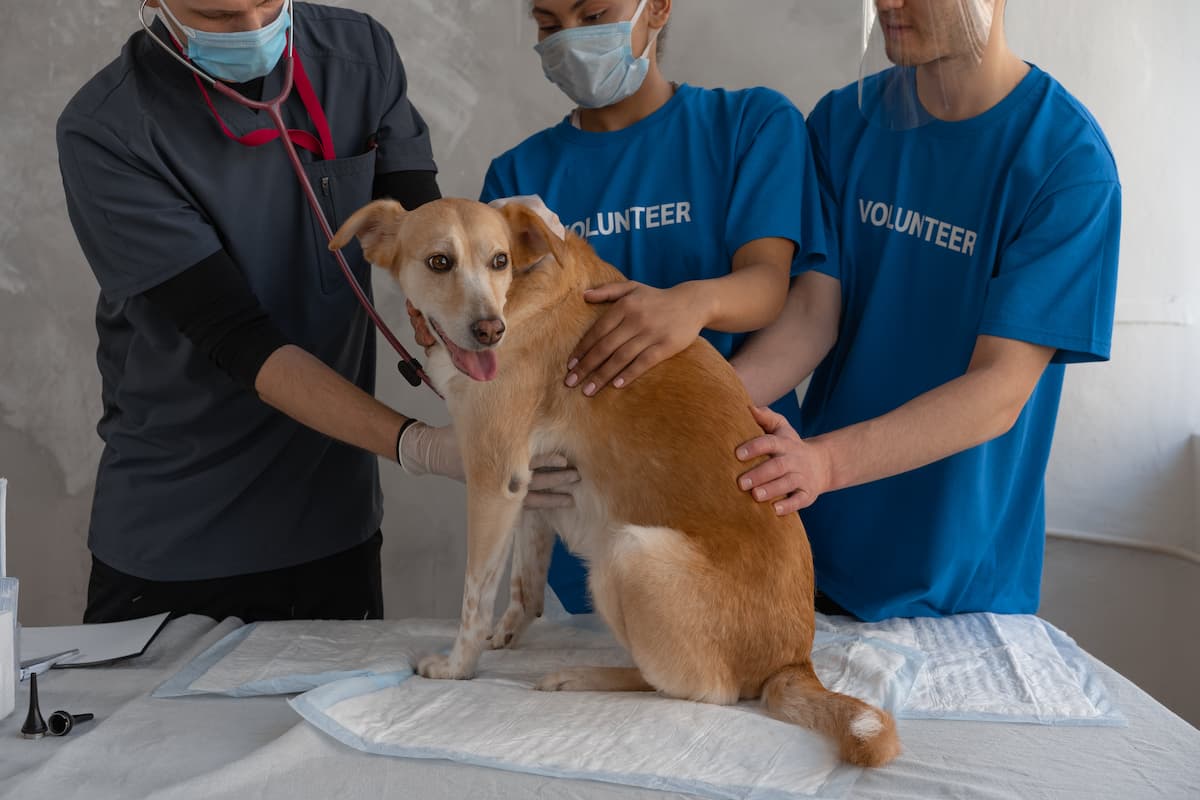Have you ever wondered why our beloved canine companions seem to bear the brunt of heartworm disease, while we humans can breathe a sigh of relief?
It’s a puzzling question, isn’t it
I mean, we all know that dogs are our best friends, so why do they have to deal with these pesky parasites while we remain untouched?
Read on to have your questions answered.
Understanding Heartworm Transmission in dogs
We’ve all heard about heartworms, those pesky parasites that can wreak havoc on our furry friends.
But why is it that dogs are the ones that often fall victim to these blood-sucking villains, while humans seem to get off scot-free?
Well, the answer lies in the complex biology of these unwelcome guests.
Heartworms, scientifically known as Dirofilaria immitis, are a type of parasitic worm that primarily infects dogs and some wild animals.
Unlike humans, dogs are the preferred hosts for heartworms, and they offer these parasites the perfect environment to thrive and reproduce.
One reason why dogs are more susceptible to heartworms is their proximity to vectors like mosquitoes, which play a crucial role in transmitting the larvae from one host to another.
When a mosquito bites an infected dog, it ingests microfilariae (microscopic heartworm larvae) along with the blood.
The mosquito then becomes a carrier, transferring the larvae to other dogs it bites.
Next comes the fascinating part.
The ingested microfilariae then take around two weeks to develop into infective larvae inside the mosquito.
Once this transformation occurs, the mosquito becomes capable of transmitting heartworms to other dogs.
So, when the infected mosquito bites another dog, it spreads these infective larvae, which then migrate to the new dog’s heart and lungs — the ideal environment for their growth.
Unlike dogs, humans are considered accidental hosts for heartworms.
Although the larvae can enter the bloodstream of humans if they are bitten by an infected mosquito, the parasites struggle to survive and complete their life cycle in our bodies.
Our immune system is more effective at recognizing and attacking the larvae, preventing them from maturing into adult heartworms.
Additionally, the anatomy of our blood vessels and heart differs from that of dogs, making it less conducive for heartworms to thrive.
One key difference between a dog’s heart and a human’s is the presence of a pulmonary artery.
In dogs, this artery carries deoxygenated blood from the heart to the lungs, where it is oxygenated, and then returns it back to the heart.
This unique circulation system creates the perfect environment for heartworms to thrive and reproduce.
So while humans may occasionally be exposed to heartworm larvae, the chance of developing a full-blown infection is extremely slim.
How Humans Can Support Heartworm Prevention in Dogs
While heartworms may be a concern exclusively for our canine friends, there are several ways we humans can play a crucial role in supporting heartworm prevention in dogs.
These tiny parasites are transmitted through mosquito bites, and since humans don’t serve as an appropriate host for heartworms, we don’t typically get infected.
However, our furry companions are not as lucky, and they rely on us to keep them safe. Here are some ways we can contribute to their well-being:
1. Regular Vet Check-ups: Schedule regular visits to the veterinarian for your dog.
These check-ups are essential for keeping their heartworm prevention on track.
Your vet will perform routine tests to ensure your pet is in good health and prescribe appropriate medications.
2. Administer Preventative Medication: It’s essential to administer heartworm prevention medications to your dog as directed by your vet.
These medications can come in the form of oral tablets, topical treatments, or injections, depending on your vet’s recommendation.
Make sure to maintain a consistent schedule for administering these medications, as they provide protection against heartworm infection.
3. Create a Mosquito-Free Zone: While it’s impossible to eliminate all mosquitoes, you can take steps to minimize their presence in your dog’s environment.
Ensure your home has screens on windows and doors to prevent mosquitoes from entering.
Additionally, consider using pet-safe mosquito repellents or insecticides in your yard to help reduce the mosquito population in the vicinity.
FAQ
Q: Have you ever wondered why dogs can get heartworms, but humans seem to be unaffected?
Let’s dig into this fascinating topic and shed some light on why these pesky parasites target our furry friends but spare us.
A: Well, my curious friends, it all comes down to the way heartworms choose their hosts.
These tiny little critters called heartworms, scientifically known as Dirofilaria immitis, are parasites that reside primarily in the hearts, lungs, and blood vessels of infected animals.
Q: So, why do dogs seem to be their preferred targets?
A: Great question!
The life cycle of a heartworm includes two primary hosts: mosquitoes and mammals.
While mosquitoes are the initial culprits that transmit these pesky parasites by taking a blood meal from an infected animal, they cannot directly infect another dog or a human with heartworms.
Q: Interesting!
So, what happens after the mosquito takes a blood meal from an infected animal?
A: Well, when a mosquito slurps the blood of an infected dog, it sucks up tiny heartworm larvae, called microfilariae, along with the blood.
These microscopic larvae develop and mature within the mosquito’s body for about two weeks, transforming into infective larvae during this time.
Q: Okay, but why doesn’t the mosquito infect humans when it bites us?
A: Ah, here’s the twist!
When a mosquito finally decides to snack on us humans, it injects saliva to help with blood flow.
Thankfully, these infective larvae carried by the mosquito are unable to penetrate our skin, searching instead for their favored host—canines—where they can complete their life cycle.
The larvae enter a dog’s body through the mosquito bite wound, making themselves quite at home in the dog’s bloodstream.
Q: That’s peculiar!
What makes dogs so irresistible to these heartworms?
A: Dogs are the natural hosts for heartworms, meaning these parasites thrive and reproduce most successfully inside canine bodies.
The environment in a dog’s bloodstream is just perfect for heartworms to grow and develop into adults.
After a few months, these sneaky worms make themselves comfortable in the heart and blood vessels of dogs, where they can reach up to a foot or more in length, wreaking havoc on their health.
Q: Alright, so why don’t humans become suitable hosts for these heartworms like dogs?
A: Humans, my friends, are simply accidental hosts for heartworms.
While humans can occasionally become infected, our bodies aren’t the optimal environment for these parasites to thrive and reproduce.
The larvae may enter our bodies through mosquito bites, but they struggle to survive and mature into adult heartworms.
Q: Phew!
It’s a relief to know that our bodies don’t make for comfortable heartworm homes.
Can we take any precautions to further minimize the risk of our dogs attacked by heartworms?
A: Absolutely!
Protecting our furry pals from heartworms is crucial, and there are preventive measures such as heartworm medications available for dogs.
Regular check-ups with your veterinarian, routine heartworm testing, and administering preventive medications can significantly reduce the risk of your dog getting infected.
The Farewell Notes
While heartworms can wreak havoc in a dog’s body, they rarely affect humans.
This is not a mere stroke of luck, but rather a combination of scientific factors at play.
The life cycle of heartworms heavily relies on specific environmental conditions and intermediate hosts, both of which humans aren’t usually exposed to.
Our busy lives and different living arrangements, not to mention our immune systems, act as a protective shield against these sneaky parasites.
But let’s not forget the importance of prevention when it comes to our beloved canines.
As responsible pet owners, it’s crucial to understand the risks heartworms pose to our furry companions.
Regular check-ups, preventive medications, and minimizing exposure to mosquitoes can go a long way in keeping our four-legged pals safe and heartworm-free.
So, while we may not have discovered a secret cure that could rid our pups of heartworms, we’ve certainly learned a lot about the unique dynamics behind this puzzling question.
Remember, knowledge is power, and being informed about the differences between dogs and humans in this regard can help us take better care of our furry family members.












